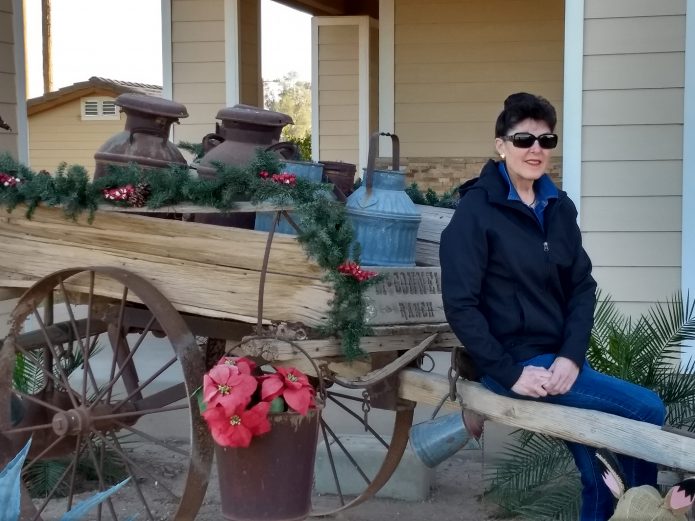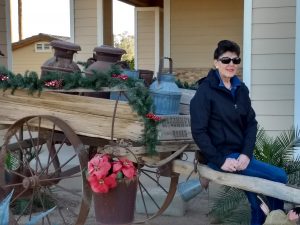
Paula McConnell Pangle, who leads the historic McConnell Ranch family trust, is photographed on an old milk wagon used by her great grandfather, Hardy McConnell, who founded the ranch 110 years ago in the Imperial Valley.
The year was 1908.
Hardy McConnell and his son Leslie were drawn by vast open lands and the great potential of the rugged, undeveloped Imperial Valley. Father and son left Temescal Canyon, near Corona, enroute to settle in the Imperial Valley, driving two teams of horses pulling wagons, hauling farm implements, chickens and leading a cow.
It took fourteen days to cross through the mountains and desert and arrive in Imperial. When they arrived, they went to work turning stretches of sand dunes into productive farmland using teams of horses and Fresno Scrapers.
It was Hardy who founded McConnell Ranch in the Imperial Valley. Today, 110 years later, the ranch remains on the original 500 acres between Highway 111 and McConnell Road, and six generations of the family have been raised there. In the front yard of the family home is one of the original wagons Hardy used for the journey travelling from Temescal Canyon to the Valley.
Paula McConnell Pangle, Hardy’s great granddaughter, now leads McConnell Ranch, and her goal as head of the family trust is to honor those who came before by ensuring the ranch’s legacy continues. It is a legacy that includes the innovative work of her late father and mother, Jack and Pauline McConnell, to implement conservation to protect the Valley’s water supply and ensure the future for Imperial Valley agriculture.
“I am blessed to be a part of this ranch, and I want this ranch to continue,” said Pangle, who has led the ranch for five years following the tragic passing of both of her parents in a house fire. “Farming is extremely important to the Valley and to my family.”
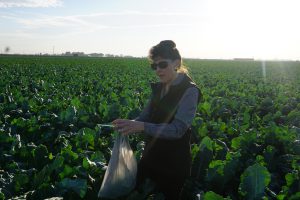
Paula McConnell Pangle walks through a field of broccolini, one of the organic crops grown on her family’s 500-acre ranch located east of Imperial.
Like her father and mother, Pangle has been involved in agriculture all her life and has taken a leadership role in Imperial Valley agriculture. She serves on a number of committees and organizations, among them the Imperial County Farm Bureau Board of Directors, founding member and Board of Director of IVH2O and a member of the Water Conservation Advisory Board—a committee that advises the Imperial Irrigation District on agriculture and conservation issues.
She does this because of her passion for agriculture and she knows her parents would want her to—it’s a way of honoring them and their family legacy. She also does it because she believes, as her father did, in the importance of using water wisely in a way that allows for successful crops to be grown while being a good steward of the Valley’s water resources. If that means making her voice heard on such issues, she is going to do that.
“I know what my dad would say to me. ‘You make sure you protect our Valley and protect our water. Keep it going as if we were here,’” said Pangle who resides with her husband, David, on the family ranch in her childhood home.
To spend time with Pangle is to come to know a woman who finds peace on her family’s farm among the green and red fields of organic romaine lettuce that are being harvested at the time of this interview. She takes pride in her family’s long history in the Imperial Valley. It is a history recognized on a plaque presented by the Native Sons of the Golden West and placed on a hay bale fence on McConnell Ranch that designates the farm as a historical site.
The family’s story is one of sacrifice, overcoming hardship and even loss to build a successful farming operation.
Hardy McConnell was already a farmer and dairy rancher near Corona when he saw the possibilities for growth in the Imperial Valley. Choosing to sell his operation in Corona, he bought land in the Valley and made the wagon journey to the desert with his family.
Leslie McConnell, Hardy’s son, was among the family that made the trip. He was 15 at the time. At a young age, Leslie was thrust into the leadership role for the family ranch when a farming accident killed his father, Hardy.

Pictured are Pauline and Jack McConnell, Paula’s parents, who worked together as a team to build McConnell Ranch. They both served as agricultural and community leaders in the Imperial Valley, and emphasized the importance of conserving water to protect local agriculture. They each were honored as Farmers of the Year in 2007 by the Imperial County Farm Bureau.
Leslie, Pangle’s grandfather, not only maintained the family farm, but he took part in the building of the All-American Canal, an 83-mile waterway that brings Colorado River water into the Imperial Valley, enabling the desert to become one of California’s most fertile agricultural regions.
Pangle’s father, Jack, also helped with the All-American Canal.
“At the young age of 8, he would lead fresh teams of horses to the dig site to help build the canal,” Pangle said.
Her grandfather was also responsible for bringing electricity to the ranch in 1930. Before then, like all pioneering families in the Valley, they survived the scorching summers with ice boxes and by using wet sheets when sleeping.
“My father would tell me the most important two things they got when they had electricity were a refrigerator and a fan,” Pangle said.
Leslie McConnell passed away in 1955 after suffering a heart attack while working the land. The torch then passed to her father, Jack.
Pangle said her father and mother believed in hard work. Jack would be working in the fields at dawn, and he believed in a truly family-run operation, which meant everyone in the family did their share for the farm.
Her mother, Pauline, was just as busy on the farm. At one point, she even took the lead in working the operation when, in the ’60s, Jack suffered a broken back in a farm accident. While he recovered, Pauline ensured the operation never slowed. Pangle described her parents as a true team.
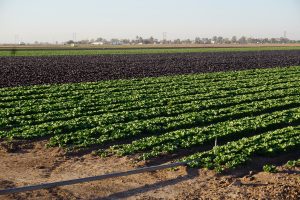
Pictured are fields of red and green Romaine lettuce recently harvested on the McConnell Ranch farm ground. The McConnells have been a leader in developing water conservation practices on their fields.
Jack McConnell implemented a conservation program in 2003 even before the signing of the Quantification Settlement Agreement, which was meant to reduce California’s use of the Colorado River within its 4.4-million-acre-foot annual allotment. A cornerstone of the QSA is the water transfer agreement between the Imperial Irrigation District and the San Diego County Water Authority—the largest agriculture-to-urban water transfer in the nation. The transfer program is only possible through a conservation program.
Pangle said her father realized conservation was critical to the future of farming, so he implemented a program on his own—a gravity-fed cascading system that meant, at his own cost, realigning his entire farming operation and building a reservoir.
“Dad was a leader in water conservation. He installed the water conserving system because it was the right stewardship measure for his farm. He had the foresight to know that the future of farming in Imperial Valley would be tied to water conservation,” Pangle said.
Since 2003, Pangle said, the McConnell Ranch has conserved close to 40,000 acre-feet of water (compared to pre-conservation farming) and today has moved from her father’s cascading system into a system conservation program, which further helps conserve. The family farm currently grows organic produce and has for the last 15 years as her father decided that would be the best use of their farm ground and water.
In 2007, Imperial County Farm Bureau honored Jack and Pauline as farmers of the year for their dedication to agriculture, leadership, and innovative spirit.
Five years later, in 2012, in their 66th year of marriage, Pauline and Jack died suddenly and tragically in a house fire. Jack was 89. Pauline was 87. It was a loss that rattled not only the farming community but the entire Valley. For Pangle, the pain of their passing remains, but a photo of her parents on the mantle over her fireplace gives her strength in her role as the head of the family farm.
Pangle, who attended Central Union High School in El Centro, and earned her bachelor’s in agriculture business from California Polytechnic University, Pomona, always planned for a career in agriculture.
One of four siblings (two have passed away—one of her brothers and her sister), Pangle was drawn to the agriculture way of life, and it was clear long before her parents’ deaths that she would lead the operation when the time came.
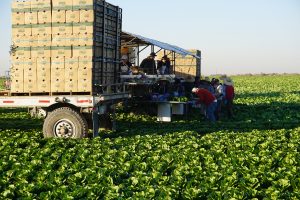
Crews harvest Romaine lettuce from the McConnell Ranch recently.
For most of her career, some 40 years, she worked in the crop protection industry while still helping her father with the farm. When she retired from her full-time work in the industry in 2011, she started her own crop protection consulting business called Agsellence, which she still operates. However, since 2012 most of her time is devoted to leading the family trust and serving the agricultural community.
It is a position she holds dear.
“I want to do whatever I can to bring honor not only to my parents but to the McConnell Ranch,” she said.
Now Pangle is training her grown nephews (her sister’s children), whom she cares for as if they were her own, to be the next in line to lead the family farm. She said the family legacy must continue just as agriculture in the Imperial Valley needs to continue and prosper.
Agriculture is the basis of this entire county,” she said, adding, “People need to remember that and remember where their food comes from. It comes from agriculture. And the hard work of those who farm.”
